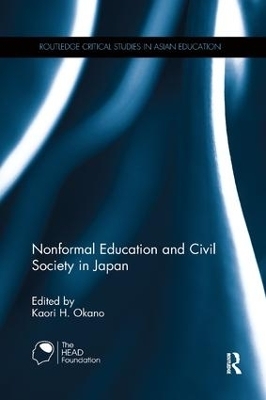
Nonformal Education and Civil Society in Japan
Routledge (Verlag)
978-1-138-57588-2 (ISBN)
Nonformal Education and Civil Society in Japan critically examines an aspect of education that has received little attention to date: intentional teaching and learning activities that occur outside formal schooling.
In the last two decades nonformal education has rapidly increased in extent and significance. This is because individual needs for education have become so diverse and rapidly changing that formal education alone is unable to satisfy them. Increasingly diverse demands on education resulted from a combination of transnational migration, heightened human rights awareness, the aging population, and competition in the globalised labour market. Some in the private sector saw this situation as a business opportunity. Others in the civil society volunteered to assist the vulnerable. The rise in nonformal education has also been facilitated by national policy developments since the 1990s.
Drawing on case studies, this book illuminates a diverse range of nonformal education activities; and suggests that the nature of the relationship between nonformal education and mainstream schooling has changed. Not only have the two sectors become more interdependent, but the formal education sector increasingly acknowledges nonformal education’s important and necessary roles. These changes signal a significant departure from the past in the overall functioning of Japanese education. The case studies include: neighbourhood homework clubs for migrant children, community-based literacy classes, after-school care programs, sport clubs, alternative schools for long-term absent students, schools for foreigners, training in intercultural competence at universities and corporations, kôminkan (community halls), and lifelong learning for the seniors. This book will appeal to both scholars of Japanese Studies/Asian Studies, and those of comparative education and sociology/anthropology of education.
Kaori H. Okano is Professor in Asian Studies/Japanese, School of Humanities and Social Sciences, La Trobe University, Melbourne, Australia.
1. Nonformal education in Japan: Its interface with formal schools 2. The homework club and beyond: A civil society group’s quest to build a place for learning and belonging in a time of migration 3. The importance of nonformal education in the success of Dôwa Education 4. Community based after-school care programs in Japan: Potential of non-formal education for children and residents 5. Homo Athleticus: The Educational Roles of Extracurricular Clubs in Japanese Schools 6. Alternative Schools: An Educational Safety-net for Long-term Absent Students 7. The changing relationship between ‘schools for foreigners’ and formal schools 8. Education and training for the intercultural competence of Japanese university graduates: Policy, practice and markets in informal education 9. Kōminkan: Its Roles in Education and Community-Building 10. Lifelong learning universities in the ageing society: Empowering the elderly
| Erscheinungsdatum | 12.10.2017 |
|---|---|
| Reihe/Serie | Routledge Critical Studies in Asian Education |
| Zusatzinfo | 75 Tables, black and white; 5 Illustrations, black and white |
| Verlagsort | London |
| Sprache | englisch |
| Maße | 156 x 234 mm |
| Gewicht | 453 g |
| Themenwelt | Sozialwissenschaften ► Ethnologie |
| Sozialwissenschaften ► Pädagogik ► Allgemeines / Lexika | |
| Sozialwissenschaften ► Pädagogik ► Bildungstheorie | |
| Sozialwissenschaften ► Pädagogik ► Erwachsenenbildung | |
| Sozialwissenschaften ► Soziologie ► Spezielle Soziologien | |
| ISBN-10 | 1-138-57588-7 / 1138575887 |
| ISBN-13 | 978-1-138-57588-2 / 9781138575882 |
| Zustand | Neuware |
| Haben Sie eine Frage zum Produkt? |
aus dem Bereich


